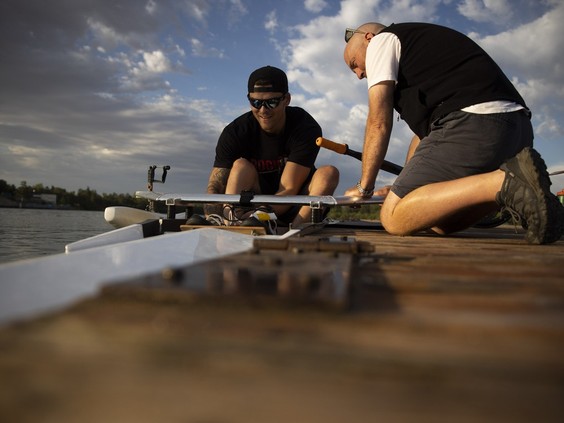
Darrell Davis
Saskatoon StarPhoenix
From virtually the moment he started rowing, Jacob Wassermann had a goal in mind:
Qualifying for the Paralympics.
It seemed possible, six years of intensive training to make the 2028 Games in Los Angeles. Except Wassermann — a survivor from the Humboldt Broncos bus crash — did much better than that, finding himself thriving on the pain and competition to earn a silver medal at the 2024 World Rowing Americas Paralympic Rowing Regatta in Rio de Janeiro that ultimately earned him a berth in this year’s Paralympics.
“I like to compete,” said Wassermann, who will be joined in Paris by his wife, brother and their parents. “I like how hard the workouts are, too. You gotta be a little bit crazy to be a rower and to enjoy some of the pain that comes with it.
“That comes with the training and with the racing. It’s a bit of a thrill, too, to be out there on the water and doing things that I wasn’t doing before I was injured.”
Wassermann leaves Saturday for the 2024 Paralympics in Paris, where he will be in men’s PR1 single sculls, a 2,000-metre race for rowers without leg or trunk function. Competition starts Aug. 30.
Wassermann is from Humboldt. After a recent workout he recalled growing up kicking soccer balls and playing mini-sticks because hockey was the sport he first loved. Two years ago a friend suggested he try rowing.
“So I went to give it a try and I’ve got a good build for it,” said Wassermann. “I’m really tall. And I really enjoyed the people that were there and enjoyed the workout that came from it.”
Wassermann lives and trains in Saskatoon. He has spent much of the past month — six days per week with twice-daily, two-hour on-water training sessions — working on current-free Wascana Lake in Regina with John Wetzstein, the Saskatchewan Rowing Association’s head coach and technical director.
“You don’t generally see things happen this quickly on the able-bodied side of things,” said Wetzstein, who will be attending his third Paralympics as a Canadian coach. “It takes a little longer and there’s a deeper talent pool. But if you have athletic aptitude and are willing to put the work in, then there’s opportunities.
“He’s demonstrated a capacity to achieve the speeds that we need now, into Paris and beyond … It’s exciting that he’s actually shown the capacity to go as fast as we’re gonna need him to go.”
A goalie on the Broncos and one of 13 survivors from the junior hockey team’s 2018 bus crash, Wassermann was paralyzed from the waist down. Like several teammates, he has found other sports to continue stoking his competitive fires. And those teammates are among his most ardent fans.
“All those guys are my biggest supporters, I think, besides my wife and family for sure,” said Wassermann, adding that he’s also grateful for the support he continues getting from others across Canada.
“They’re the best. We keep in touch all the time. At least once a year we all try to meet up and they’ve sent lots of words, saying they’re pumped for me and they can’t wait to watch me out there.”
There will be nine other athletes and three more coaches from Saskatchewan attending the Paralympics: Nikita Ens of Meadow Lake and Shelby Newkirk and Hannah Ouellette, both of Saskatoon, in para swimming; Regina’s Nik Goncin and Garrett Ostepchuk in wheelchair basketball; Melfort’s Julie Kozun in sitting volleyball; Saskatoon’s Ashlyn Renneberg in para athletics; Asquith’s Ryan Rousell in wheelchair fencing; and Midale’s Keely Shaw in para cycling.
The other Regina-based coaches are Frank Gaudet (badminton) and Carla Nicholls (athletics) plus Saskatoon’s Ryan Jones (swimming).

